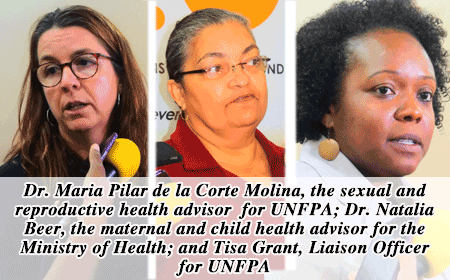BELIZE CITY, Fri. Oct. 26, 2018– The United Nations Population Fund (UNFPA) held a media launch today at the Belize Best Western Biltmore Plaza to share information on the 2018 State of the World Population Report. The report, which is entitled “The Power of Choice,” focuses on the global trends in the growth of the world’s population, as well as people’s sexual and reproductive rights.
“The Power of Choice” reflects the choice that more and more people have in determining how many children they wish to have. The report shows that this power is leading to families having fewer children than in the past, where it was observed that at least 5 children would be born in each household.
The power to choose the amount of children one wants to have is directly linked to having the education necessary to make an informed decision, and having access to the necessary services. The decision people make is usually based on their reproductive health and income.
This, however, also means that people with less access to sexual education and families with a lower income tend to have that choice taken away from them, especially if there is a lack of access to contraception. This then leads to a cycle which begins with families having to struggle with the amount of children they have since they do not have sufficient information to adequately plan how many children would be best for them.
Dr. Maria Pilar de la Corte Molina, the sexual and reproductive health advisor for UNFPA, explained this some more.
“If you talk about countries with high fertility rates, those countries, the population, face lack of access to sexual reproductive health services, lack of education, lack of access to comprehensive sexuality education, gender imbalances that limit women to choose the number of children that they would like to have and also policies that in some cases don’t enable them to have the right to choose,” she said.
“And then you have those countries with low fertility rates where you can see it is difficult for many couples and women in making a balance between careers and having children. Also because childcare is very expensive so they cannot afford to have more children and also because in these countries there is the delay of maternity,” Dr. Molina continued.
While the report was launched worldwide on October 17, the media launch allowed members of the media to get specific details about what the report reflects for Belize.
Dr. Natalia Beer, the maternal and child health advisor for the Ministry of Health, explained that, “Adolescent birth rate plays a role, especially for us here in Belize, especially since it is still high in contributing to this total fertility rate. It’s a complex indicator that is linked to economic and social factors, social determinants, where the issue highlighted in the report is the issue of choice.”
“We have currently in the last years, 1,400 and 1,500 girls delivering before completing twenty years of age. So we call that ‘adolescent moms.’ In the ideal world, no adolescents should be having kids, but we have on the other hand the law where with parental consent up to the age of sixteen, parents can consent for marriage,” Dr. Beer continued.
She mentioned as well that the Ministry of Education is providing the services in schools through health and family life education. There is also the Belize Family Life Association (BFLA) that provides comprehensive sexual education and services to adolescents.
While adolescent moms are proving to be a rising issue, Tisa Grant, Liaison Officer for UNFPA, explained how UNFPA is assisting to address the issue, including supporting the procurement of the necessary contraceptives in order to make them more accessible to people.
She also said that the support that UNFPA gives is guided by the priorities of the Ministry of Health. Recently, the support has been primarily aimed at adolescent health, and so UNFPA has been directing the bulk of its support to that area of need.
“We are conducting currently an assessment of the provision of sexual and reproductive health services to young people as well as marginalized groups including even those persons with disabilities,” said Grant.
The 2018 State of the World Population Report is available to the public on UNFPA’s website at unfpa.org.

